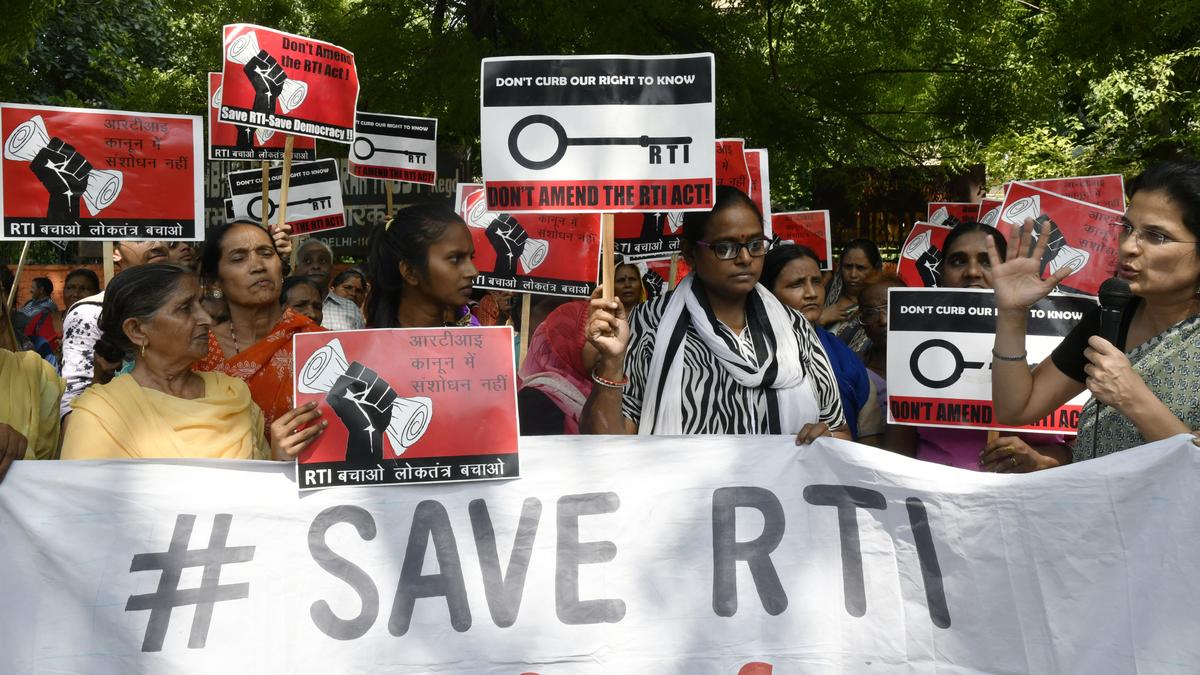The National Campaign for the Right to Information protests against changes to the RTI Act, in New Delhi. File
| Photo Credit: The Hindu
The Right to Information (RTI) Act, 2005, has been one of the most empowering laws for Indians. From exposing corruption in the delivery of basic rights to bringing to light the truth behind the opaque electoral bonds scheme, the law has been used by citizens to hold power to account. Therefore, it is no surprise that there is a severe backlash against both the legislation, which has just entered its 20th year, and those who use it.
Vacant posts
Governments are scuttling the RTI Act by not appointing information commissioners and allowing the commissions to crumble under the weight of mounting backlogs. A 2023-24 report of the Satark Nagrik Sangathan, a citizens group that campaigns for transparency in government functioning, shows that seven out of 29 information commissions were defunct for varying periods of time last year. The commission of Jharkhand has not been functional for over four years, while those of Tripura and Telangana have been defunct for three years and one and a half years, respectively.
Many information commissions were found to be functioning without an adequate number of commissioners, despite large backlogs. The information commission of Maharashtra, with a backlog more than 1 lakh appeals and complaints, is headless. Six out of 11 posts of commissioners are lying vacant. Since May 2015, not a single information commissioner has been appointed to the Central Information Commission by the Central government without citizens having to approach courts. Despite repeated directions by the Supreme Court, eight out of 11 posts are vacant in the Central Information Commission.

Under the RTI Act, information commissions are the final appellate authority and are mandated to safeguard and facilitate people’s right to information. They have wide-ranging powers, including the power of direct disclosure of information which the government finds inconvenient. It is because adequate information commissioners have not been appointed that more than 4 lakh appeals and complaints are pending in information commissions across India. The report shows that it would take more than a year for an appeal or complaint to be disposed in 14 commissions. A fresh appeal filed in Chhattisgarh or Bihar would be disposed only in 2029. While hearing a petition regarding vacancies in information commissions across India, in 2023, the Supreme Court noted that the failure to fill vacancies is leading to a situation where “the right to information which is recognised under an Act of Parliament becomes a dead letter.”
Even when appointments are made, a majority of the appointees are either retired government officials or people who enjoy political patronage. They are often reluctant to act against violations of the transparency law. The report shows that commissions did not impose penalties in 95% of the cases where penalties could be imposed. This failure sends a signal that violating the law will not invite serious consequences. This destroys the basic framework of incentives and disincentives built into the RTI Act, promotes a culture of impunity, and exasperates applicants who seek information at a high cost and often against great odds. The laxity in enforcing accountability allows information officers to take liberties with the RTI Act, leading to many unanswered applications and an equal number of delayed or illegitimately refused ones.

Regressive amendments
In the last five years, there have also been regressive amendments to the RTI Act. In 2019, despite strong objections from civil society and Opposition parties, the government brought amendments which dealt a blow to the autonomy of information commissions by empowering the Central government to determine the tenure, salaries, pensions and post-retirement entitlements of all information commissioners.
The Digital Personal Data Protection (DPDP) Act, 2023, included an explicit provision to amend the RTI law to exempt all personal information from disclosure. The RTI Act of 2005 provided for protection of the privacy of individuals through section 8(1)(j). In order to invoke this section to deny personal information, at least one of the following grounds had to be proven: information sought had no relationship to any public activity or public interest; or information sought was such that it would cause unwarranted invasion of privacy, and the information officer was satisfied that there is no larger public interest that justified disclosure. The DPDP Act amended section 8(1)(j) to expand its purview and exempt all personal information from the ambit of the RTI Act. It also deleted a key provision in the law, which gave citizens a right to information at par with Members of Parliament and Members of Legislative Assemblies.
According to Transparency International India data, nearly 100 people have been killed for using the RTI Act, and thousands have been assaulted, threatened, and slapped with false cases. Though the Whistleblowers Protection Act was passed in 2014, it remains confined to the statute books as the Central government has failed to formulate rules to operationalise it. Every year, some 6 million information applications are filed in India. Evidence shows that the RTI law has initiated the vital task of redistributing power in a democratic framework and transforming the relationship between the government and citizens. An erosion of this fundamental right is an erosion of democracy.
Published – October 14, 2024 12:57 am IST

